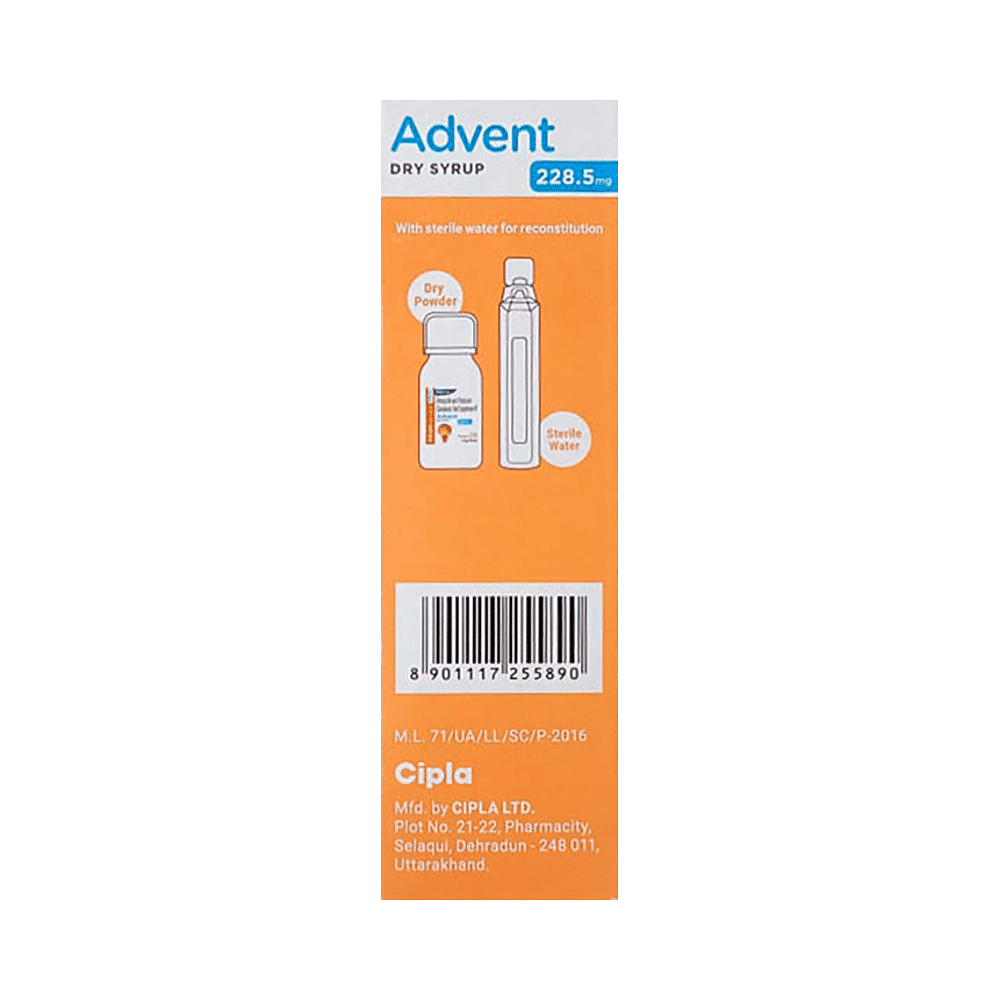
Mexclav CV Dry Syrup
Manufacturer
Medsyn Lab Biotech
Salt Composition
Amoxycillin (200mg/5ml) + Clavulanic Acid (28.5mg/5ml)
Key Information
Short Description
Mexclav CV Dry Syrup is an antibiotic medicine that helps treat bacterial infections of the ear, nose, throat, chest, lungs, teeth, skin, and urinary tract.
Dosage Form
Dry Syrup
Introduction
Mexclav CV Dry Syrup is an antibiotic medicine that helps treat bacterial infections of the ear, nose, throat, chest, lungs, teeth, skin, and urinary tract. It is capable of killing bacteria that have become resistant to other therapies and thus also helps treat tuberculosis that is resistant to other treatments.
Directions for Use
Your child must complete the entire course of antibiotics. Stopping too soon may cause the bacteria to multiply again or cause another infection.
How it works
Mexclav CV Dry Syrup is an antibiotic. It has two active agents amoxycillin and clavulanic acid. Amoxycillin works by preventing the formation of the bacterial protective covering (cell wall) essential for the survival of the bacteria. Whereas clavulanic acid serves a special purpose of inhibiting an enzyme (beta-lactamase) that is produced by resistant bacteria. This makes the combination of amoxycillin and clavulanic acid an effective line of treatment for many types of infections.
Quick Tips
Your child must complete the entire course of antibiotics. Stopping too soon may cause the bacteria to multiply again or cause another infection. Your child may have a bitter taste in the mouth after the intake of Mexclav CV Dry Syrup. Eating citrus fruit or sipping plenty of water or fruit juice may help. Encourage your child to drink plenty of water in case diarrhea develops as a side effect. Never give Mexclav CV Dry Syrup until and unless prescribed by the doctor. Do not give Mexclav CV Dry Syrup to treat common cold and flu-like symptoms caused by viruses. Never save medicine for future illnesses. Check ‘expiry’ before giving Mexclav CV Dry Syrup to your child. Immediately discard all the expired medicines. Stop Mexclav CV Dry Syrup immediately if your child develops an itchy rash, facial swelling, or breathing difficulty. Report to the doctor without any delay.
Related Medicines

Advent 228.5mg Dry Syrup Tangy Orange

Clavomost Dry Syrup

Amboxy CV Dry Syrup

Anclov Dry Syrup

Stivmox CV Dry Syrup

Fabmentin Dry Syrup

Auxgo Dry Syrup

Moxpro CV Dry Syrup

Moxigap CV Dry Syrup

Elmoclav Dry Syrup
Frequently asked questions
Can other medicines be given at the same time as Mexclav CV Dry Syrup?
Mexclav CV Dry Syrup can sometimes interact with other medications or substances. It's important to inform your child's doctor about all other medications they are taking before starting Mexclav CV Dry Syrup. Check with your child's doctor for guidance on appropriate medication combinations.
Can I get my child vaccinated while on treatment with Mexclav CV Dry Syrup?
Antibiotics generally don't interfere with the ingredients in vaccines or cause a negative reaction in children who recently received one. However, before giving any medicine to your child after they are treated for an illness, it is best to check with their doctor.
Which lab tests may my child undergo while taking Mexclav CV Dry Syrup on a long-term basis?
Periodically, the doctor might conduct kidney and liver function tests during extended therapy to monitor your child's condition.
Can I give a higher than the recommended dose of Mexclav CV Dry Syrup to my child?
No, exceeding the recommended dosage of this medication can increase the likelihood of side effects. If your child experiences worsening symptoms, consult your doctor for reevaluation.
Can I stop giving Mexclav CV Dry Syrup to my child when the symptoms are relieved?
No, do not stop giving this medication to your child unless the full course of treatment is complete, even if you feel better. Symptoms may improve before the infection is fully cured. Therefore, continue the medication according to the prescribed instructions.
Can the use of Mexclav CV Dry Syrup cause diarrhea?
Yes, Mexclav CV Dry Syrup can cause diarrhea. It's an antibiotic that kills harmful bacteria. Additionally, this medication may disrupt the balance of helpful bacteria in your child's gut, leading to diarrhea. If your child experiences diarrhea, encourage them to drink plenty of fluids. If diarrhea persists or you notice signs of dehydration, such as decreased urination with dark-colored and strong-smelling urine, consult a doctor before giving any other medication.
Do all viral common colds result in secondary bacterial infection?
Most of the time, bacterial infections do not follow viral infections. In fact, using antibiotics for a viral infection can significantly increase your child's risk of developing side effects. Therefore, antibiotics should only be given under the guidance of a doctor after consulting with them.
The mucus coming out of my child’s nose is yellow-green. Is it a sign of a bacterial infection?
Yellow or green mucus in the nose does not necessarily indicate a bacterial infection. During a common cold, mucus often thickens and changes color from clear to yellow or green. These symptoms generally subside within 7-10 days.
Is there any sign which shows that my child needs immediate medical attention?
Call your child's doctor immediately if your child experiences serious allergic reactions (difficulty breathing, skin rashes), gastrointestinal issues (diarrhea), or liver damage (weakness, paleness, vomiting). While rare, these side effects can be life-threatening and require expert medical assistance.


